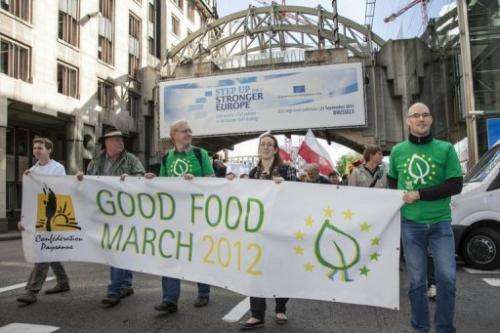A delegation of European farmers and Friends of the Earth Europe environmental group's members march outside EU buildings in Brussels on September 19 2012. Imports to meet Europe's ever-growing food demand require it using land beyond its borders roughly the size of Scandinavia, according to a new study that urges belt-tightening.
Imports to meet Europe's ever-growing food demand require it using land beyond its borders roughly the size of Scandinavia, according to a new study that urges belt-tightening.
China, Brazil, Argentina, India and the United States are the main land hosts for European consumption, but poorer nations like Ivory Coast, Kazakhstan and Ghana also contribute, said the report by campaigners Friends of the Earth Europe.
"The EU is importing the equivalent of 1,212,050 square kilometres (about 0.5 million square miles) to meet its demand for food," it said.
"It means the EU is importing 45 percent of the land it needs for the production of the food it consumes."
With every product humans consume, they also indirectly consume the land used to produce it.
"Many people don't realise the food, paper, furniture, computers, mobile phones and other products we consume in Europe have negative environmental and social impacts, mainly outside our borders," Friends of the Earth campaigner Ariadna Rodrigo said in a statement.
"Our overconsumption is directly contributing to communities losing their land, deforestation, climate change and water scarcity."
European countries with the highest land "imports" are Germany with 24 million hectares (60 acres) and Britain with about 23 million hectares, it said.
The continent is "importing" about 33 million hectares of land from China, 19 million from Brazil and 12 million from Argentina.
"Europe's quest for raw materials to fuel its economy has seen it exert undue pressure on least-developed resource-rich countries, therefore putting further pressure on foreign land resources," said the report.
On current levels, global material consumption would rise from about 70 billion tonnes today to more than 160 billion tonnes in 2030, it added.
"This would imply an escalation of pressure on already stretched global land areas."
About 38 percent of the Earth's land surface is used for agriculture, but is under pressure from a growing demand for housing space, mining and the protection of natural areas.
Friends of the Earth urged Europeans to reduce meat and dairy consumption and opt for ecologically-produced food, reduce waste, recycle and use less fuel so as to lessen the demand on fuel produced from crops.
(c) 2013 AFP

.jpg)






















